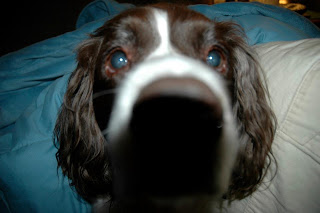POD:
- Might be the death of me
- So far we have covered cancer, tissue repair, inflammation, granulomatous inflammation, necrosis and apoptosis, hypertrophy and hyperplasia, basic terminology, and in gross pathology, how to make a morphological diagnosis
- Every other day there is a module quiz and every other week there are unit tests. All must be passed with a 70% or higher... failure means you take the test again. yay...
- There has been a surprising amount of histology - that means to you first years, learn histo the first time, because relearning it in conjunction to learning all this has been a major headache.
- It is kind of cool to actually start seeing "medical" stuff - there is an obvious, clinical problem and what is going on in the body to make it happen
Therio
- We have started our cow palpations
- This is a learned skill, it takes practice to master
- By "palpation" I mean rectal palpation of the reproduction tract
- Once we are comfortable and can start actually feeling and identifying structures we can move to mares! They are more challenging because they are less tolerant and have smaller tracts
Euchre Tournament
- I ran a fundraising euchre tourny last week with the help of my fellow SoCos!
- $120 raised for our class (goes towards running events, our fourth year play, and our grad/prom) and had a $50 cash prize for the winners
- 64 people on 32 teams - 3 games of round robin then quarter finals lead to single eliminations
- I was so happy to have members of each phase (Caracals, Stags, Elephants, Pheonixes) come out, to see friends, housemates, and significant others participate, and even an enthusiastic prof show up!
Winners "Trumper Thumpers" getting their Certificate of Trumping
Halloween
- Frat party is this Friday!!!
- My costume is done thanks to my Mom, but the buyf still needs his pants to be sewn and my housemate still needs help with her dress
- We are going to Trick-or-Eat (www.trickoreat.ca) again this year! So far we have a team of 10 but I hope that I can rally a few more in the final week! We had a blast last year and I know this year will be the same. It is such an easy way to give back to the community
- Pictures to come
Other things of note:
- New Ink
- My family got a new puppy in May, Winnie, she is 9 months now and so full of life! Her and Pippa "get along" - Winnie pretty much just chases Pip around the house while Pippa plots world domination and naps in the window sill.
- Hockey this year is going really well. I feel like I have come leaps and bounds since last year! I even got an assist last week!
- Weight loss has seemed to plateau since September so I am working hard this week to get back on track and reach my goal by Christmas!
- I am still very much in love <3
- Movember is coming....
Stag head plus Rod of Asclepius
Winnie chasing a Balloon
<3
Please visit my friends blog "Life in Vet School". I write sometimes for him, as do other members in my class, and he illustrates sometimes!!
A couple fun sites you may enjoy to help you procrastinate:
- Rainy Mood www.rainymood.com
- Vet School High http://vetschoolhigh.tumblr.com/
- 4 years of vet school http://4yearsofvetschool.tumblr.com/
- Vet school paradise http://vetschoolparadise.tumblr.com/
- Cat Bounce http://cat-bounce.com/
- How To Pet A Kitty http://theoatmeal.com/comics/kitty_pet
- Robot Chicken "Euthanasia" http://www.youtube.com/watch?v=dnWDfc2fS54
- Baker Cat! http://belarr.com/bakercat/ ****WATCH WITH SOUND! I PROMISE YOU WILL SMILE!
- A baby racoon http://www.stumbleupon.com/su/2vofH7/:1tVb8+z3$:SFx6dkGQ/www.firecold.com/videos/an-orphan-baby-raccoon/
- And to show you how Bad Ass Stags are http://video.insider.foxnews.com/v/1882322579001/


.JPG)


.JPG)
.JPG)














